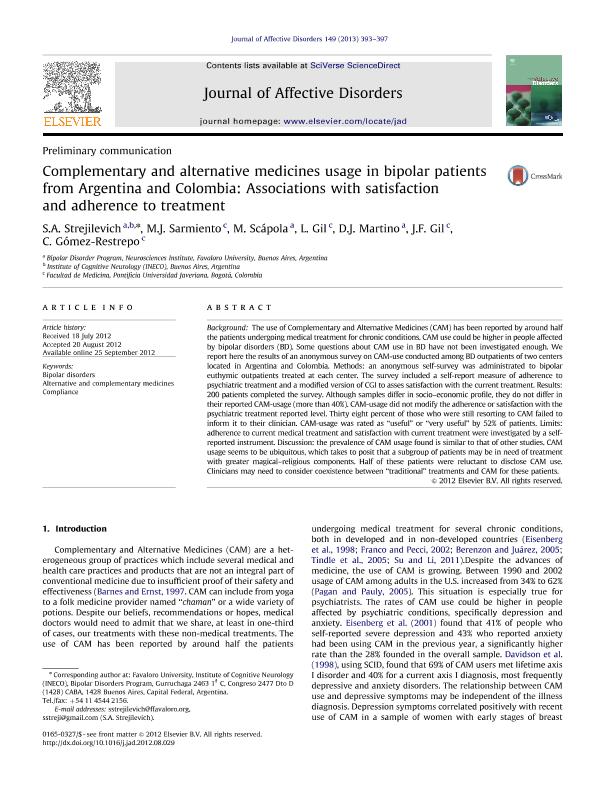Mostrar el registro sencillo del ítem
dc.contributor.author
Strejilevich, Sergio

dc.contributor.author
Sarmiento, M. J.
dc.contributor.author
Scápola, M.
dc.contributor.author
Gil, L.
dc.contributor.author
Martino, Diego Javier

dc.contributor.author
Gil J.F.
dc.contributor.author
Gómez Restrepo, C.
dc.date.available
2017-09-22T20:19:22Z
dc.date.issued
2013-07
dc.identifier.citation
Strejilevich, Sergio; Sarmiento, M. J.; Scápola, M.; Gil, L.; Martino, Diego Javier; et al.; Complementary and alternative medicines usage in bipolar patients from Argentina and Colombia: Associations with satisfaction and adherente to treatment; Elsevier Science; Journal of Affective Disorders; 149; 1-3; 7-2013; 393-397
dc.identifier.issn
0165-0327
dc.identifier.uri
http://hdl.handle.net/11336/24996
dc.description.abstract
BACKGROUND: The use of Complementary and Alternative Medicines (CAM) has been reported by around half the patients undergoing medical treatment for chronic conditions. CAM use could be higher in people affected by bipolar disorders (BD). Some questions about CAM use in BD have not been investigated enough. We report here the results of an anonymous survey on CAM-use conducted among BD outpatients of two centers located in Argentina and Colombia. METHODS: an anonymous self-survey was administrated to bipolar euthymic outpatients treated at each center. The survey included a self-report measure of adherence to psychiatric treatment and a modified version of CGI to asses satisfaction with the current treatment. RESULTS: 200 patients completed the survey. Although samples differ in socio-economic profile, they do not differ in their reported CAM-usage (more than 40%). CAM-usage did not modify the adherence or satisfaction with the psychiatric treatment reported level. Thirty eight percent of those who were still resorting to CAM failed to inform it to their clinician. CAM-usage was rated as "useful" or "very useful" by 52% of patients. LIMITS: adherence to current medical treatment and satisfaction with current treatment were investigated by a self-reported instrument. DISCUSSION: the prevalence of CAM usage found is similar to that of other studies. CAM usage seems to be ubiquitous, which takes to posit that a subgroup of patients may be in need of treatment with greater magical-religious components. Half of these patients were reluctant to disclose CAM use. Clinicians may need to consider coexistence between "traditional" treatments and CAM for these patients.
dc.format
application/pdf
dc.language.iso
eng
dc.publisher
Elsevier Science

dc.rights
info:eu-repo/semantics/openAccess
dc.rights.uri
https://creativecommons.org/licenses/by-nc-sa/2.5/ar/
dc.subject
Bipolar Disorders
dc.subject
Complementary Medicines
dc.subject
Alternative Medicines
dc.subject
Compliance
dc.subject.classification
Reumatología

dc.subject.classification
Medicina Clínica

dc.subject.classification
CIENCIAS MÉDICAS Y DE LA SALUD

dc.title
Complementary and alternative medicines usage in bipolar patients from Argentina and Colombia: Associations with satisfaction and adherente to treatment
dc.type
info:eu-repo/semantics/article
dc.type
info:ar-repo/semantics/artículo
dc.type
info:eu-repo/semantics/publishedVersion
dc.date.updated
2017-09-21T18:56:06Z
dc.journal.volume
149
dc.journal.number
1-3
dc.journal.pagination
393-397
dc.journal.pais
Países Bajos

dc.journal.ciudad
Ámsterdam
dc.description.fil
Fil: Strejilevich, Sergio. Universidad Favaloro. Facultad de Medicina. Instituto de Neurociencias. Programa de Trastornos Bipolares; Argentina. Instituto de Neurología Cognitiva; Argentina. Consejo Nacional de Investigaciones Científicas y Técnicas; Argentina
dc.description.fil
Fil: Sarmiento, M. J.. Pontificia Universidad Javeriana; Colombia
dc.description.fil
Fil: Scápola, M.. Universidad Favaloro. Facultad de Medicina. Instituto de Neurociencias. Programa de Trastornos Bipolares; Argentina
dc.description.fil
Fil: Gil, L.. Pontificia Universidad Javeriana; Colombia
dc.description.fil
Fil: Martino, Diego Javier. Universidad Favaloro. Facultad de Medicina. Instituto de Neurociencias. Programa de Trastornos Bipolares; Argentina. Consejo Nacional de Investigaciones Científicas y Técnicas; Argentina
dc.description.fil
Fil: Gil J.F.. Pontificia Universidad Javeriana; Colombia
dc.description.fil
Fil: Gómez Restrepo, C.. Pontificia Universidad Javeriana; Colombia
dc.journal.title
Journal of Affective Disorders

dc.relation.alternativeid
info:eu-repo/semantics/altIdentifier/url/http://www.sciencedirect.com/science/article/pii/S0165032712005988
dc.relation.alternativeid
info:eu-repo/semantics/altIdentifier/doi/http://dx.doi.org/10.1016/j.jad.2012.08.029
Archivos asociados
